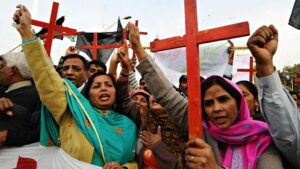Christians in Pakistan Seek Fair Representation
 Christians in Pakistan Seek Fair Representation
Christians in Pakistan Seek Fair Representation
Christian communities across Punjab are voicing deep frustration over a new local government law they believe sidelines religious minorities from meaningful political participation. The Punjab Local Government Act 2025 the legal framework for local polls expected later this December has sparked a wave of criticism from minority-rights advocates.
The law allows voters in more than 4,000 union councils to elect nine general members directly. But four categories of reserved seats for minorities, women, laborers/farmers and youth will now be filled through nominations controlled by political parties instead of direct public voting. Christian leaders, who form the bulk of Punjab’s minority population, say this approach dilutes their voice and undermines constitutional protections.
Samson Salamat, head of Rwadari Tehreek, called the move a serious blow to democratic rights. He said communities must be allowed to choose their own representatives. “Selecting candidates behind closed doors is undemocratic and pushes minorities further to the margins,” he said during a public gathering at the Lahore Press Club on Nov. 7.
Salamat also warned that non-party elections limit accountability. Without clear party affiliation, he argued, voters cannot easily judge a candidate’s beliefs or promises.
Katherine Sapna, executive director of Christians True Spirit, said the new system contradicts Article 140-A of Pakistan’s constitution, which requires elected local bodies to exercise political and administrative powers. She noted that minorities have struggled since the proportional representation model was introduced in 2002, and the latest change repeats the same pattern at the grassroots level.
ALSO READ: Missionary Father, Daughter Die in Florida Aid Flight Crash
Three rights groups Rwadari Tehreek, Christians True Spirit and Human Friends Organization have filed a petition in the Lahore High Court, asking for the right to directly elect minority-reserved seats.
Speakers at the assembly, including clergy, lawyers and civil-society activists, also demanded that the government restore direct elections to ensure fairness, equality and genuine public participation. Punjab last held local polls in 2015.
The system of allocating minority seats through party lists dates back to reforms under former military ruler Pervez Musharraf. Under the joint electorate model, minorities vote for general seats while parties are awarded minority-reserved positions based on their overall performance, provided they win at least 5% of seats.
Former provincial minister for human rights and minorities affairs, Ejaz Alam Augustine, said repeated attempts to fix the system have stalled. “Grassroots empowerment is essential, especially for communities already facing discrimination. But no government has taken real steps to change the structure,” he said.
Pakistan’s constitution currently sets aside 10 seats for non-Muslims in the National Assembly, 24 in provincial assemblies and 4 in the Senate. But minority-rights advocate Azam Mairaj argues these positions rarely reflect community choices. He said parties often nominate loyalists who lack strong ties to the people they are meant to represent.
Mairaj called for a dual-vote system that would allow minorities to vote in general elections and also elect their own candidates for reserved seats. He suggested that a constitutional amendment could strengthen representation and bring it in line with the preamble’s commitment to safeguarding vulnerable groups. He also proposed creating minority-based constituencies or smaller electoral units to reflect population size where necessary.
Content Credit: Moyosola Oni
Image Credit: Google .Com




